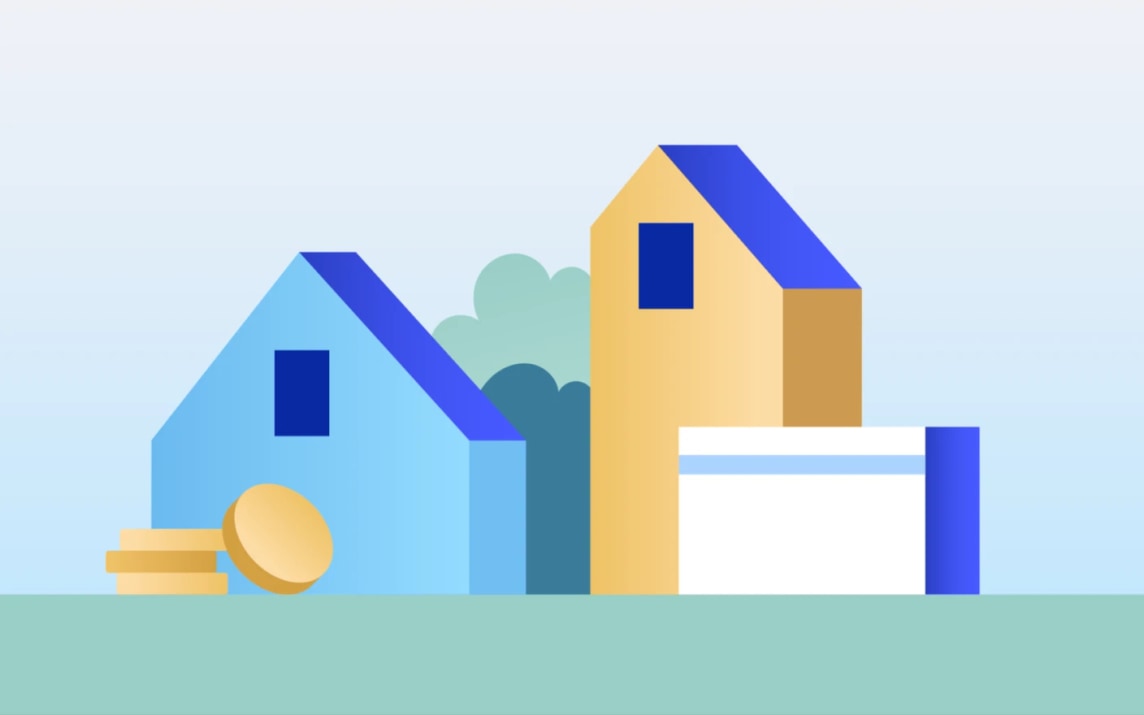Renting vs. buying: pros and cons
Choosing whether to rent vs. buy is a very personal decision. When asking yourself, is it better to rent or buy a house, you’ll want to consider the advantages and disadvantages that come with renting vs. buying.
Buying pros
To start, buying has its advantages, many of which are money-related.
Builds equity. One of the big reasons people buy is that they’re ready to settle into one location for a while, which allows them to build equity. In other words, as you pay off your mortgage, more of the home’s value becomes yours.
Home values typically increase over time. Buying a home can be a good investment, as the value of the property may increase over time. However, this is not guaranteed and there may be periods of decline or stagnation in the housing market.
Tax advantages. Owning a home comes with tax benefits, such as the mortgage interest deduction, which means you must itemize your deductions whenever you file your taxes. Looking for guidance on understanding the tax implications of owning a home? Reach out to FinanceHQ to connect with an advisor who can help.
Boost your credit score. Paying a mortgage on time can help improve your credit score, while paying rent generally doesn't.
Freedom to customize. If you enjoy home projects like painting and renovating, homeownership makes sense. Owning a home means you have the freedom to do what you like. Renting means any major changes will have to go through a landlord.
Stability. Owning a home can provide a sense of stability and security, free from the worry of landlord issues and rent increases.
Buying cons
Despite building equity and being able to customize the home, you may want to reconsider if any of one or more of these cons affect you.
More upfront and variable costs. Buying a home is costly — both upfront and monthly. To buy a home, you’ll need a down payment and closing costs, but that’s just the beginning. Monthly mortgage payments can be high, especially if you’re locked into a high-interest rate. Unlike an apartment, you’re responsible for all upkeep, such as needing a new roof or boiler, which can be quite expensive.
Long-term commitment. Once you buy, it may be more difficult to relocate, even to a different part of the city. You’ll have to sell your current home and then go through the home-buying process all over, unless you consider renting out your first home, which comes with more responsibilities. Depending on housing prices, capital gains taxes, and selling costs, it may take several years before selling your home makes sense.
Could lose money. Despite what many think, there's no guarantee home values will rise. In addition, despite a clean home inspection report prior to purchase, major repair issues could arise such as plumbing, electrical and structural.
Renting pros
While owning a home is still part of the “American Dream,” more people are realizing that renting works for their lifestyle. Here are some benefits to renting a home:
Cheaper in the short term. Is it cheaper to buy or rent a house? If you run the numbers, renting is generally always cheaper in the short term. A good rule is that if you don’t plan to stay in a home that you purchased for at least five years, you’ll likely lose money.
Freedom to move. Renting provides more flexibility than buying. It’s easier to move to another state or country, but it’s also as easy to try a different area in the city after your lease ends.
Fewer responsibilities. You won’t be responsible for any maintenance issues or repairs. If something breaks, your landlord should fix it. This makes budgeting and being able to stick to a savings plan much easier.
Renting cons
Even if you think renting is ideal for you, here are pitfalls to look out for:
Rent will rise. While renting makes it easier to budget, rent prices will likely be higher when you have to renew your lease.
Renting lacks certain financial advantages. Despite a lower monthly cost, renting means you’ll miss out on building equity and tax deductions. While tax deductions are less of a factor for many, the lack of equity is something renters often worry about missing out on.
Can’t customize the home. Renting means you can only make minor changes. Some landlords won’t allow you to drill holes or paint the walls, while others will ask to revert any changes once you move out. Additionally, most rentals will charge a deposit and a monthly fee for pets, and some rentals do not allow pets at all.
Important factors to consider
If you’re still asking yourself, should I rent or own a home, deciding whether or not to be a first-time homebuyer comes down to five key factors worth considering.
1. Home prices vs. rent prices in the area you want to live
The biggest conversation most people have about renting vs. owning is the monthly cost. In other words, what will your monthly rent payment vs. mortgage payment be? Local home prices and rental prices determine that. If home prices are high in your area, renting could be a good idea for a while.
2. Mortgage interest rates
Mortgage rates will play a key factor in determining your monthly payment. The difference of a couple percentage points will change a home’s affordability. For example, your monthly principal and interest payment on a $275,000 mortgage for 30 years with a 4% rate is $1,500. That same loan with a 7% interest rate is over $2,000 a month.
That said, when rates are high, the housing market tends to slow down and homes become more affordable. This offers the ability to buy a home during a down market, with the idea of refinancing your home later.
3. Hidden costs of home ownership
Most are aware that you need a down payment and closing costs before buying a home, but many new homeowners fail to plan for unexpected costs, including:
Property taxes
Homeowners insurance
Water and sewer service
Extra forms of insurance, such as flood or earthquake
Repairs and maintenance
Landscaping and tree trimming
Snow removal
Appliance replacement
4. How long you want to stay put
This one may seem like a no-brainer, but if you’re going to move in the short-term, you should consider renting. Buying a house is a much larger commitment to the area. And if you know you’ll be staying put for a while, you can check out the neighborhood in greater detail.
5. Your current financial situation
Are you financially ready to buy? That’s the question that lenders will ask. You’ll be on the hook for monthly mortgage payments for the length of the loan, typically for 30 years. If you’re uneasy about being able to make the monthly payment and save for unexpected repairs, renting could be for you.
But making the mortgage payment is just one aspect of buying a home. This means taking a big-picture view of your finances, including your income, credit, and savings.
Reasons renting might make more sense
You should consider renting if you:
Don’t have an emergency fund
Are still paying down high-interest debt
Have trouble sticking to a budget
Enjoy apartment or HOA amenities
Need flexibility or are unsure where to live
Live in a location where home values are expensive
Expect major life changes in the near-term
Reasons buying might make more sense
Buying a home is worth strong consideration if you:
Are at a stable point in your life
Would like to customize your space
Want to build equity
Have enough saved to buy
Will be staying put for a while
Have debt and credit at a safe level
Can find a home in your price range

